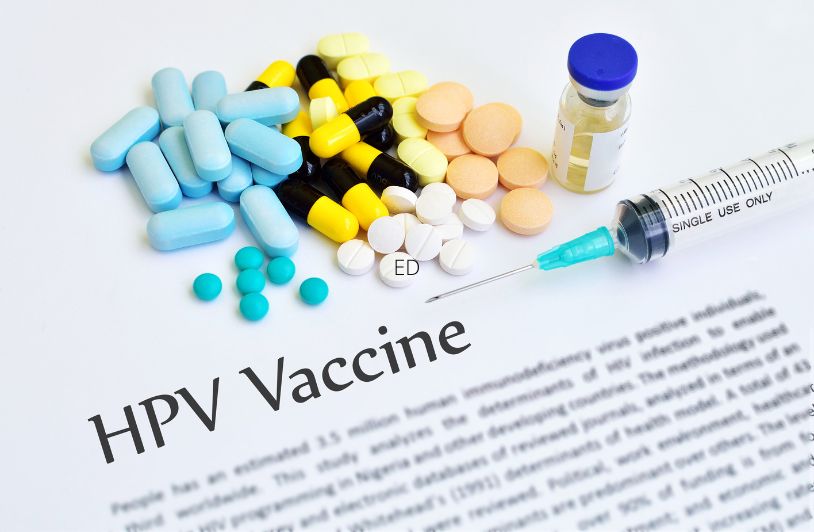Health experts recommend HPV vaccination for children between 11 and 12 years, but vaccination can start from age nine. Preteens need the HPV vaccine to protect them from HPV infection that may result in cancer in the later stages of life.
Teenagers and young adults through age 26 who did not get the HPV vaccine or complete their dose of the vaccine also need the HPV vaccine.
Healthcare professionals recommend that children ages 11 and 12 get two doses of the HPV vaccine, 6 – 12 months apart. The vaccination recommendation includes:
- Administering the HPV vaccine first dose at ages 11 – 12. Children can start the vaccine at nine years.
- Two doses are essential if the child takes the first dose before their 15th birthday.
From ages 15 to 26, young adults and teens who get the vaccine need three doses of the HPV vaccine. The recommendation for this vaccination include:
- Three doses for people aged 9 – 26 with a weakened immune system
- Children between 9 and 14 who took two doses of the vaccine less than five months apart need the third dose.
Vaccination for everyone older than 26 years who did not receive the HPV vaccine earlier is unnecessary. However, some persons need the HPV vaccine.
Some adults between 27 and 45 years who did not receive the HPV vaccine may decide to get vaccinated after consulting their doctor concerning the risk of a new HPV infection and the potential benefits of vaccination.
Vaccination after 26 years offers fewer benefits because more people within this age have already had exposure to HPV.
Who doesn’t need the HPV vaccine?
Ensure you inform your doctor if you have severe allergies. The HPV vaccine is unsuitable for the following people.
- People with a life-threatening allergic reaction to an ingredient in the vaccine or the previous dose of the vaccine
- People allergic to yeast (Gardasil and Gardasil 9)
- Pregnant people
Children who are mildly ill can still get HPV vaccines. The vaccine is safe even for children with a runny nose, cough, a cold, or low-grade fever and a temperature reading of 101 degrees. A child with moderate to severe illness needs to wait until they feel better to get the vaccine.
Which HPV vaccines are available?
Three HPV vaccines are available. They include:
- 9-valent HPV vaccine (9Vhpv, Gardasil 9)
- Bivalent HPV vaccine (2Vhpv, Ceravix)
- Quadrivalent HPV vaccine (4Vhpv, Gardasil)
These HPV vaccines protect from HPV types 16 and 18, resulting in HPV cancers.
How effective are the HPV vaccines?
The HOV vaccines are effective and can prevent over 90% of HPV-related cancers. The following data proves the effectiveness of these vaccines.
- Since the introduction of HPV vaccination, HPV infections that cause more cases of genital warts and HPV cancers have reduced by over 80% in teens and young adult women.
- Fewer young adults and teenagers have genital warts
- These HPV vaccines have reduced the number of cervical precancerous cells in younger women
- Protection from HPV vaccines lasts for a long period. A study that monitored people who got the HPV vaccine for 12 years showed higher protection from HPV,which didn’t reduce overtime.
What side effects may occur?
Like medicines, vaccines may have side effects. Many people who receive the HPV vaccine do not experience any side effects, but some report mild side effects like soreness in the arm they got the vaccine.
The following side effects may occur, but they are usually mild.
- Redness, pain, or swelling in the arm where the healthcare provider administered the vaccine
- Nausea
- Tiredness or headache
- Fever
- Joint or muscle pain
- Fainting or dizziness (this side effect is more common in adolescents)
To prevent injuries from fainting, the adolescent should sit or lie down while getting the vaccine and remain in the position for about 15 minutes after vaccination.
In rare cases, (anaphylactic) allergic reactions may occur following vaccination. Anyone with severe allergies to any ingredient in the vaccine should not get the HPV vaccine.
Where are HPV vaccines available?
You can get HPV vaccines at your Private GP, hospitals, health departments, and school health centres. Your GP can give you a referral if the HPV vaccine is unavailable in the office.
How can I pay for HPV vaccines?
Most insurance providers cover routine vaccinations. You can contact your health insurance company to ask if your plan covers HPV vaccines.
If you are looking for a place to get HPV vaccination London, visit Medical Express Clinic or call us on 020 7499 1991 to arrange an appointment for your vaccination.

